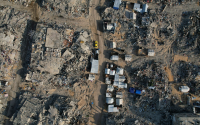30 December 2009
For Imthital al-Dayam, the loss of her husband, Arfa - his body riddled with shrapnel from an Israeli shell that hit the ambulance he was helping to crew on the first day of the Israeli ground invasion of Gaza last January - was traumatic enough. But then she discovered that the traditional Gazan family solidarity, which sustained thousands of the injured and bereaved over the past year, can have a more painful side.
Imthital, Arfa and their four sons had moved temporarily into her father-in-law's house because it was thought to be in a safer neighbourhood. On the day of his death, 4 January, Arfa left the al-Awda Hospital in northern Gaza in one ambulance on his first call of the day just after 8am. He returned fatally wounded in another less than an hour later. The three-man crew had been alerted to war injuries in the neighbouring town of Beit Lahiya. As they began lifting the wounded into the ambulance, it was shelled; the vehicle was destroyed, the driver injured, the second crew member killed instantly - and Arfa was critically wounded.
Worse was to come: less than 24 hours later, as the family was preparing coffee and dates for visiting mourners, more Israeli shells struck, at least one of them containing lethal flechettes, four-centimetre steel darts. Five members of the al-Dayam family, plus a neighbour, were killed.
Eleven months on and sitting in his front yard in Izbet Beit Hanoun, bathed in warm late-autumn sunshine, Arfa's father, Hani, repeatedly rubs his forehead as he recalls that day. "[My son] was the kind of man who, if he saw even an animal suffering, he would go to help." Before he went on shift that morning at eight, he had brought scarce bread to his father's home. "He was dead by 10am."
On the day of Arfa's death, his wife had returned alone to the couple's home to clean up and prepare food. No one remembered to call her to tell her that her husband had come under fire, let alone been killed. She returned to the al-Dayam house ten minutes before her husband's body was brought back.
Since then, she says, it has been "very dif ficult". Her parents live 25 kilometres away in Khan Younis; though she earned $300 a month as a secretary for the UN, she became largely reliant on local charities to supplement her income and to repay debts, some of them to al-Dayam family members.
All of this might have been easier had Imthital agreed to the proposal her father-in-law put to her in April - that she should marry her late husband's younger brother, Nassim. As she herself says, this is a not uncommon demand of the widows of shuhada (martyrs) - and she and her four boys, all younger than ten, would have fallen once again under the protective ambit of her in-laws.
But she was having none of it; she didn't want to remarry, and she didn't want to comply with Hani's demand that the family rent out the bottom floor of their old home, because, she says, "I didn't want strangers living in my house." Hani turned uglier. "He wanted me out of the house, and the children. He pushed me out." She says she was "on the streets" until 11pm, when (Hamas) police brought her back and demanded that her father-in-law stop harassing her. She still feels vulnerable to his pressure. So, wouldn't it be easier simply to do as he asked? "I love my husband too much," she says.
The al-Dayam shelling is the subject of one of more than 20 inquiries on which Israel is relying as its defence against demands for a wider and independent war crimes investigation. The respected Israeli human rights group B'Tselem is among those expressing dissatisfaction with the scope of inquiries confined to "isolated incidents" and not holding top figures in the military or the government to account.
Gaza is used to bloodshed, of course; this narrow and densely populated 360-square-kilometre strip in the south-eastern corner of the Mediterranean has been fought in and over for much of its 3,500-year history. Occupied in the 20th century by the Turks, the British, the Egyptians and, along with the West Bank after the 1967 Six Day War, the Israelis, it had its most rapid period of population growth after the arrival of Palestinian refugees from what is now Israel during and after the 1948 war. Today a million of its 1.5 million people are refugees or descendants of refugees.
Yet, even by the standards of Gaza's past, Operation Cast Lead, the three-week military offensive Israel launched from 27 December 2008, was unprecedented. Although the military disputes the figures, the respected Israeli human rights agency B'Tselem puts the total of Palestinian deaths at 1,387. Of these, 773 were civilian non-combatants. The war was started with the stated purpose of ending the surge of rocket attacks on southern Israel by Gaza militants. These began when a ceasefire broke down, after an Israeli raid in November. Hamas refused to renew the ceasefire without an end to a two-and-a-half-year blockade - something that Israel, having declared Gaza a "hostile entity" in September 2007, was never likely to grant.
The trauma suffered by Imthital al-Dayam was echoed in the experience of many others during the 23-day onslaught on Gaza. Ata Armilat lost his wife, his mother and three of his daughters, aged between two and a half months and 15. But the aftermath for Armilat has been rather more positive. His family had abandoned a flimsy home in the northern town of Beit Lahiya, with its corrugated iron walls and dirt floor, to rent a nearby house, in the hope that it would be safer from bombing. They were right.
On the morning of 14 January, a neighbour called Armilat to tell him that his own house had been destroyed by Israeli missile fire. The next morning, as the women and children searched the wreckage for family possessions, a second missile or shell landed in the ruins, scattering their body parts.
B'Tselem, which investigated the deaths, acknowledges that about half an hour before the attack, Palestinian militants had fired a rocket from a spot near the house. But in its official complaint - one of many - to Israel's attorney general about the prima facie breach of humanitarian law, it pointed out: "The firing at the Armilat family occurred while they were sitting on the ruins of their house, visible to everyone, in an open area."
Armilat is now slowly rebuilding his shattered life. A solicitous uncle has found him a new home, persuaded him to marry again and, in Armilat's words, "helped and encouraged me all the time". To reach him now, you climb the stairs in the Sheikh Zayed apartment complex, first occupied in May 2005, in perhaps the most hopeful period in Gaza's recent history: Mahmoud Abbas had succeeded the late Yasser Arafat on a platform of making peace with Israel; Ariel Sharon was preparing to withdraw settlers and the military from the Gaza Strip; and many people still thought, wrongly, as it turned out, that the Israeli prime minister would co-ordinate the disengagement with the new Palestinian president, in a way that might have strengthened Abbas's position ahead of the January 2006 parliamentary elections. In the event, the elections were won by Hamas.
Today, after two years of siege, the landscaped gardens of Sheikh Zayed are dilapidated and there is a pervasive smell from the nearby sewage works, a reminder of the decay of infrastructure even as the population has surged over the past decade. Nevertheless, for Armilat, it means a new start, even if he was still feeling his loss keenly on the eve of Eid ul-Adha in late November. "When you have children and then suddenly you don't," he says, "when you lose your wife and mother and now the feast is coming, it is going to be very difficult." His bride of four months, Faris, who is 27, has helped him "about 50 per cent" to recover, but he says of his former wife and three children: "I will never forget them."
Like most unaffiliated Gazans, Armilat observes that the Israeli onslaught did little, if anything, to reduce Hamas's power; instead, it just caused "more misery for the people, the people not in Hamas". However, he blames Hamas for most of Gaza's problems. "Change the Hamas government," he says, "and then there will be a future here."
His uncle Shehadeh al-Bahri, 58, and a family friend, Abdullah Abu Qaida, 65, both of whom voted for Hamas in the 2006 elections, strongly disagree. While acknowledging that Hamas has made "mistakes", al-Bahri lays most of the blame on Fatah for the disagreement over control of security, which led to the collapse of the short-lived coalition brokered by the Saudis in 2007. He also blames Fatah for the brief but savage civil war between the two factions, Hamas's victory and seizure of full control, and the consequent Israeli siege of Gaza. "The police did not co-operate with Hamas even though they won the [2006] election," he says.
What is interesting about this argument is that it is entirely amicable. "I have one point of view and he has another, but we love each other," says al-Bahri. And both older men say, unprompted and with wistful enthusiasm, that they would have supported the late Haidar Abdel-Shafi if he had been well enough to stand for the presidency after Arafat's death.
The choice is significant. Abdel-Shafi, a widely revered Gazan doctor and Palestinian nationalist, was neither Hamas nor Fatah. A leftist member of the tiny minority of Palestinians who had supported a two-state solution since it was embodied in the UN partition resolution of 1947, he led the Palestinian delegation at the Madrid conference in 1991. Principled, uncorrupt, above faction, he broke with Arafat over the Oslo Accords in 1993. He believed - many would say prophetically - that it contained the seeds of its own destruction by not halting Jewish settlement-building in the West Bank and by leaving a final-status solution to future negotiations.
Reconcilation between Fatah and Hamas, yearned for by most non-affiliated Palestinians, in the absence of a unifying figure such as Abdel-Shafi, who died in 2007, seems as far off as it ever was. Israel has never wanted it; the United States has done nothing to encourage it. The two factions sometimes seem in an unspoken agreement about a situation that leaves them split and in charge of their respective territories: Fatah in the West Bank and Hamas in Gaza. The firing of rockets by Gaza militants into Israel has been hugely reduced since the war; and at least some of the few that have been launched appear to be the work of a Salafist extremist minority that has emerged as the main competition to Hamas. But although there is no shortage of people in Gaza such as Armilat prepared to criticise Hamas, as any government presiding over economic meltdown is criticised, that is very far from enacting the fantasy that current Israeli policy will create a popular revolt to dislodge the Islamic faction. After all, Hamas has the guns, a substantial core constituency and control of the streets.
To visit Gaza is to discover people attempting to rebuild their ruined lives, against often daunting odds. Middle-class Gazans are returning to the beachfront hotels to drink coffee, smoke narghile or celebrate birthdays with sparkler fountains gushing from cakes, brought by waiters to the strains of "Happy Birthday, Cha Cha Cha". Thanks to the goods smuggled through the tunnels from Egypt, some families have begun to rebuild their homes. There are even stirrings of economic life - for example, in the use of war rubble mixed with Egyptian cement, which is being used to produce the breeze blocks needed for small-scale reconstruction. Unemployment remains at 45 per cent or more, yet there has been a very slight growth in employment, some of it in international NGOs concerned with postwar rehabilitation.
Yet even if there were not new fears that the steel wall that Egypt appears to be building along Gaza's southern border at Rafah will reduce, if not eliminate, the tunnel capacity that acts as the territory's lifeline, none of this would constitute a proper recovery. John Ging, operations director in Gaza for the UN refugee agency UNRWA, says that what made life worse for Gazans after the war was the "psychological devastation" caused by the snuffing out of the "glimmer of hope" that was carried on a wave of international sympathy. It was this sympathy that had generated international pledges of more than $4.5bn for the reconstruction of homes, businesses, public buildings and infrastructure, and with it the prospect of jobs and at least a partial end to what Ging calls the "collective punishment" of the previous two and a half years.
Yet those pledges have remained unfulfilled, because with all the main crossings - including the main commercial crossing, Karni - closed for all but basic humanitarian supplies, there was no possibility of bringing in the materials the money would have bought. This has exposed the disjunction between the international community's rhetorical calls for the lifting or at least easing of the siege and the absence of the kind of pressure which would have ensured that it happened. Launching a joint call before Christmas by the main aid agencies for just such pressure to be brought on Israel, Jeremy Hobbs, Oxfam's international director, accused "world powers" of having "wrung hands and issued statements but taken little meaningful action to attempt to change the damaging policy that prevents reconstruction, personal recovery and economic recuperation".
Ging points out that, of the European foreign ministers, only those of Sweden and Norway have visited Gaza. Of development ministers, only Douglas Alexander and his Dutch counterpart, Bert Koenders, have done so. Yet, Ging says, "It is blindingly obvious to anybody who has the political courage to come and face the counterproductive consequence of these policies that it is urgent that we change."
One of those consequences is the collapse of Gaza's private-sector economy. Several of the most productive factories, in sectors ranging from cement to biscuits and ice cream, were wholly or partly destroyed during the war by bombardment of the industrial zone close to the Israeli border. But the devastation began long before that, with the territory's agricultural and manufacturing sectors brought to a standstill by the Israeli blockade of the exports and imports on which they depended.
Hundreds of small- and medium-sized firms, many in flourishing trading partnerships with Israeli companies (for example, in the clothing sector, Gaza's biggest), have closed since the blockade imposed in response to Hamas's enforced seizure of control in June 2007. At a time when 80 per cent of Gaza's population is dependent on food aid, 94 per cent of the 120,000-strong private-sector workforce is unemployed. As Ging says, while the black-market tunnel economy is expanding, "The businessmen who were partners of Israeli companies, who had all the security clearances that Israel wanted them to have, who were genuine friends of their Israeli counterparts, who were committed to a stable, peaceful coexistence, have been impoverished. That is a breakdown of the economic infrastructure of society."
The failure to begin reversing this process of "de-development" would be more understandable if it were succeeding in its presumed objective of loosening Hamas's grip on power. Yet there is now a consensus, even among mainstream diplomats, that it is not.
Tony Blair, envoy for the Quartet - the EU, Russia, the UN and the US - concedes that the freeing of the abducted Israeli soldier Gilad Shalit, who has been held captive by Hamas since June 2006, would make it easier to persuade Tel Aviv to lift the siege. Blair has repeatedly called for a "new approach" to Gaza and has spoken of "windfall gains" by Hamas from the imbalance between the legitimate and illegitimate economies. These are not only the 10,000-shekel licence fees the Hamas authorities impose for tunnel start-ups, the charges they make for electricity underground or the money they make from distribution of goods imported through the tunnels. The "windfall" has also widened the pool of labour from which the Hamas de facto government can recruit its own employees. These range from civil servants to policemen and members of the faction's military wing.
Striking figures in a forthcoming analysis of labour force data by the UN economist Salem Ajluni suggest that, in the two years between June 2007 and 2009, as private-sector employment imploded, Hamas increased the public-sector payroll in Gaza by as much as 20,000. What is even more remarkable is that the rise - filling in gaps left by former public-sector workers still paid by the Palestinian Authority in the West Bank to stay at home, as well as staffing the expanded security apparatus under Hamas control - accounts for nearly all employment growth in that period.
Jawdat Khoudary, a Gaza businessman with interests from construction to manufacturing, is one of several who believes that most of the 200-plus workers he has been obliged to lay off have joined the Hamas payroll. He believes that Washington should have demanded an end to the siege when Binyamin Netanyahu took office as Israeli prime minister in March 2009, and that this goal might have been more realisable than the total settlement freeze that Barack Obama urged on him. Khoudary is impatient with the Palestinian president for focusing only on the settlements. "Why doesn't Abu Mazen [Mahmoud Abbas] make ending the siege a condition of talks? Why forget about Gaza?"
Believing that many Gazans are disillusioned with both Hamas and Fatah, Khoudary thinks that Abbas's prime minister, Salam Fayyad, who is in neither faction, could command a sizeable Gazan constituency at a stroke (he puts it at up to 40 per cent) if he took specific diplomatic action on the territory's behalf. Here Khoudary cites the debilitating psychological and practical effects of the population's imprisonment in Gaza and argues that Fayyad should issue a public demand to Egypt to allow the orderly passage, subject to security checks, of several thousand Gazans through the Rafah crossing each week.
Recently the draconian restrictions imposed by both Egypt and Israel on Gazans seeking to travel - including gravely ill medical patients - have been compounded by bureaucratic security procedures imposed by Hamas within Gaza. Khoudary suggests in passing that, if Israel wanted, it could let "the people fight Hamas in a positive way" by substantially increasing the number of permits it issues for passage through the northern Erez crossing, thus turning up the popular heat on Hamas's own restrictions. There is little sign of that happening.
Back in the village of Izbet Beit Hanoun, Hani al-Dayam, 52, and his brother Jamal, 59, look back on the catastrophe that overtook their family last January. Despite the traumatic dispute with his daughter-in-law, Hani passes on her phone number; perhaps he accepts that she has another side of the story to tell.
Like many Gazans of their generation, both brothers speak Hebrew. They used to have Jewish friends and worked in Israel for nearly 30 years until the crossings closed. Both are adamant that there were no Hamas militants active in the area at the time of the shelling last January. "This is a peaceful area," Jamal says. "The Israelis must have known that."
The brothers have been to the Erez crossing in recent weeks to tell as much to Israeli military police investigators. "We are not afraid at all. We told them everything, exactly as it happened." Hani believes that peace is possible: "Both Israelis and Palestinians were created by God." And yet, reflecting on the attacks that killed his son and five other close relatives, he says: "I just want to ask the world: Why did they have to do this to us? Is it because we tried to help the injured? Is it because we want our children to be educated? Is this what we get because of that?"
Donald Macintyre is Jerusalem correspondent of the Independent






